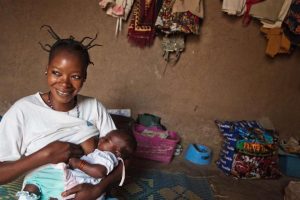The Civil Society Scaling Up Nutrition in Nigeria (CS-SUNN)
has urged the National Assembly to enact laws that would promote breastfeeding
to boost nutrition indices.
Miss Lilian Ajah-mong, spokesperson of the organisation,
stated this in on Sunday in Abuja in a statement made available to newsmen to
commemorate the 2017 World Breastfeeding Week.
The CS-SUNN, is a coalition of the Partnership for Advocacy
in Child and Family Health (PACFaH ).
Ajah-mong said that the enactment of the laws would protect
mothers while practicing exclusive breastfeeding.
She noted that such legislation would clamp down on
employers of labour who do not adhere to the stipulated maternity leave months
for nursing mothers.
Ajah-mong called on all decision makers, partners and
relevant stakeholders in the health sector to forge purposeful affiliations
that would improve health interventions for Nigerians.
“According to the Nigeria Demographic and Health Survey
(NDHS) 2013, more than 5 million newborns in Nigeria lack essential nutrients.
“They also lack antibodies that would protect them from
diseases and death as they are not being exclusively breastfed.
“We call on the National Assembly to enact laws that will
protect safe medications for mothers and their infants and ensure strong
regulations on marketing of breast milk substitutes or baby formulas.
“This will also enable nursing mothers in Nigeria to be
entitled to the constitutional right to breastfeed and newborns the right to be
breastfed anywhere, any day and at all times,” she said.
Ajah-mong stressed the need to attain the 50 per cent
exclusive breastfeeding targets in the National Strategic Plan of Action on
Nutrition (NSPAN) by 2018.
She added that the goal of sustainable promotion and support
for optimal breastfeeding would require priority attention in terms of funding
and monitoring of progress.
The organisation spokesperson urged governments and other
stakeholders to include a budget line for nutrition in the health system.
She also called for nutrition budgets, increase budgetary
allocation, timely release of allocated funds for immediate programming and
implementation of nutrition interventions.
“Health care practitioners have a key role in influencing
child care behaviours and practices of the mothers as they are frequently
visited by mothers and children for routine care during sickness.
“We task health care practitioners to scale-up appropriate
nutrition counselling on the benefits and management of breastfeeding; early
skin to skin contact, exclusive breastfeeding soon after delivery,” Ajah-mong
said.
The World Breastfeeding Week is celebrated across the globe
to encourage breastfeeding and improve the health of babies around the world.
The theme for this year’s celebration is “Sustaining
exclusive breastfeeding together”


Post a Comment Blogger Facebook